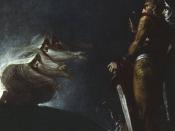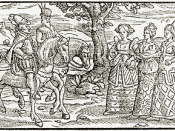"Fair is Foul, and foul is fair," these lines are the very backbone of Shakespeare's play. This oxymoron aptly describes the macabre status quo within the character Macbeth and without. In other words what seems from outside is not what is from within. The lines are chanted by the three witches at the start of act 1 scene 1. They seem to give a sense of foreboding to the audience of the dark event about to take place. The couplet sets forth the values of the play and gives an eerie and forbidding effect to it. It is worth noting that when Shakespeare writes a couplet he is very serious. Interestingly the first words Macbeth speaks refer to a fair and foul day. Thus Shakespeare emphasizes the importance of the line again at the start of scene 3.
The lines told by the weird sisters at the start of the play carry throughout the play and are among the most important theme Shakespeare builds Macbeth on.
The fact that it is the witches who say it gives significance since witches are evil and they delight in confusing people in what is good and what is bad.
They do just that confusing Macbeth till his understanding of right and wrong is blurred. Till the fair Macbeth becomes the foul Macbeth. The couplet does not make much sense at the beginning but as the play progresses the meaning becomes clear and we understand that what seemed fair that is Macbeth was actually foul. First through the narration of the wounded captain we learn of the bravery and greatness of Macbeth. Then we meet Macbeth who in turn meets the weird sisters. Instead of being happy as he should be if one has just been prophesized he is silent. His body language does not show optimism either he seems to 'start' upon being proclaimed as a future king.
What does Shakespeare mean by Fair? A definition of fair is something that is positive which embodies good values. Interestingly Macbeth is described in Scene 2 of Act 1 by the wounded captain as a person possessing many of those 'Fair' qualities. We know that he is brave as seen from the lines of the captain- 'Like valor's minion, carved out his passage'. This ghastly line depicts a brave soldier willing to risk his life for the king by 'Carving' his passage through group of soldiers and then slicing the rebel Macdonwald in two. These are the fair qualities of the valiant Macbeth. It is also worth noting that everyone mentioned so far tends to praise him. If he was foul then why would everyone praise him? Thus so far we associate Macbeth with bravery, loyalty, strength, fearlessness, selfless and as a good general.
It is only after we meet Macbeth in Scene 3 that the true meaning of the lines is understood. In scene 3 Macbeth and Banquo meet the 3 witches and again what is fair and what is foul is mentioned. The witches are foul. When Macbeth and Banquo see the weird sisters, Banquo is horrified by their hideous appearances. Conversely, Macbeth immediately began to converse with these foul meaning evil creatures. After hearing their prophecies, one can say that Macbeth considered the witches to be "fair" when in reality their intentions were quite "foul." As the play progresses and king Duncan's messengers meat Macbeth and reward him with the Thane Of Cawdor (the witches 2nd prophecy) Macbeth and Banquo are shocked that the Devil spoke true. At this point Banquo warns Macbeth of the devils policy of letting us win trifles so as to make us his instruments. At this point the ambitious Macbeth shows us for the first time why he might be foul. He thinks about murdering his lord the king. The thought of killing king Duncan scares him and yet he feels attracted to the power of the throne. For the first time the audience through dramatic irony can see in Macbeth's mind and what they heard so far about him from others is opposite of what his thoughts tell them about him. His thoughts are foul.
Now the meaning is clear so far Macbeth seemed fair and now he is foul. What seems foul is fair and vice versa. The audience saw Macbeth as affair and loyal general till the end of scene 2. But from Scene 3 onwards the audience can see that he is not fair but foul. He is not loyal but a scheming general planning to kill his lord King Duncan. However he is not without a conscience. He is profoundly shocked by his ambition. Thus he is fighting an internal conflict. He is power hungry and yet finds the thought of killing Duncan oppressive. Thus he convinces himself that he has a choice and that he need not kill the king to become one. Fate might take its own course and make him king (the witches 3rd prophecy) without his stir.
Thus the Fair Macbeth turned foul.





